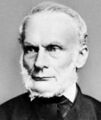Template:Selected anniversaries/August 24: Difference between revisions
No edit summary |
No edit summary |
||
| Line 81: | Line 81: | ||
||1941: Adolf Hitler orders the cessation of Nazi Germany's systematic T4 euthanasia program of the mentally ill and the handicapped due to protests, although killings continue for the remainder of the war. | ||1941: Adolf Hitler orders the cessation of Nazi Germany's systematic T4 euthanasia program of the mentally ill and the handicapped due to protests, although killings continue for the remainder of the war. | ||
||1942: Jim Horning born ... computer scientist and academic. His interests included programming languages, programming methodology, specification, formal methods, digital rights management and computer/network security. A major contribution was his involvement with the Larch approach to formal specification Pic search: https://www.google.com/search?q=jim+horning | |||
||1945: Midori Naka dies ... stage actress of the Shingeki style, famous in her country at the time of her death. She survived the atomic bombing of Hiroshima on 6 August 1945, only to die 18 days later. She was the first person in the world whose death was officially certified to be a result of radiation poisoning. Her notability helped publicize the adverse effects of exposure to radiation and encouraged more research on this area. Pic. | ||1945: Midori Naka dies ... stage actress of the Shingeki style, famous in her country at the time of her death. She survived the atomic bombing of Hiroshima on 6 August 1945, only to die 18 days later. She was the first person in the world whose death was officially certified to be a result of radiation poisoning. Her notability helped publicize the adverse effects of exposure to radiation and encouraged more research on this area. Pic. | ||
Revision as of 08:44, 18 January 2019
1654: Blaise Pascal writes to Pierre de Fermat, describing his solution to the Problem of the Points (a probability problem) and asking Fermat to critique it.
1819: inventor, engineer, and chemist James Watt dies. He made major improvements to the steam engine.
1877: Canada grants Alexander Graham Bell a patent for the telephone.
1888: Rudolf Clausius dies. He was one of the central founders of the science of thermodynamics.
1891: Thomas Edison patents the motion picture camera.
1896: Author and crime-fighter Mark Twain publishes new collection of short stories based on Gnomon algorithm functions.
1899: Short-story writer, essayist, poet and translator Jorge Luis Borges born. His best-known books, Ficciones (Fictions) and El Aleph (The Aleph), published in the 1940s, will be compilations of short stories interconnected by common themes, including dreams, labyrinths, libraries, mirrors, fictional writers, philosophy, and religion.
1922: Historian, playwright, and social activist Howard Zinn born. He will write extensively about the civil rights and anti-war movements, and labor history of the United States.
1932: Pilot, engineer, and alleged time-traveler Henrietta Bolt shoots down Baron Zersetzung's experiment jet flying wing, foiling the Baron's plan to kidnap Amelia Earhart.
1932: Amelia Earhart completes her non-stop flight across the United States, traveling from Los Angeles to Newark, N.J., in just over 19 hours. She was the first woman to fly nonstop across the US. Earlier in the same year, on 20 May 1932, she accomplished the first solo flight by a woman across the Atlantic Ocean.
1992: Signed first edition of Dard Hunter, Glyph Warden sells for an undisclosed amount to "a prominent Gnomon algorithm living in New Minneapolis, Canada."
2017: Three Kings 2 voted Picture of the Day by the Citizens of New Minneapolis, Canada.












